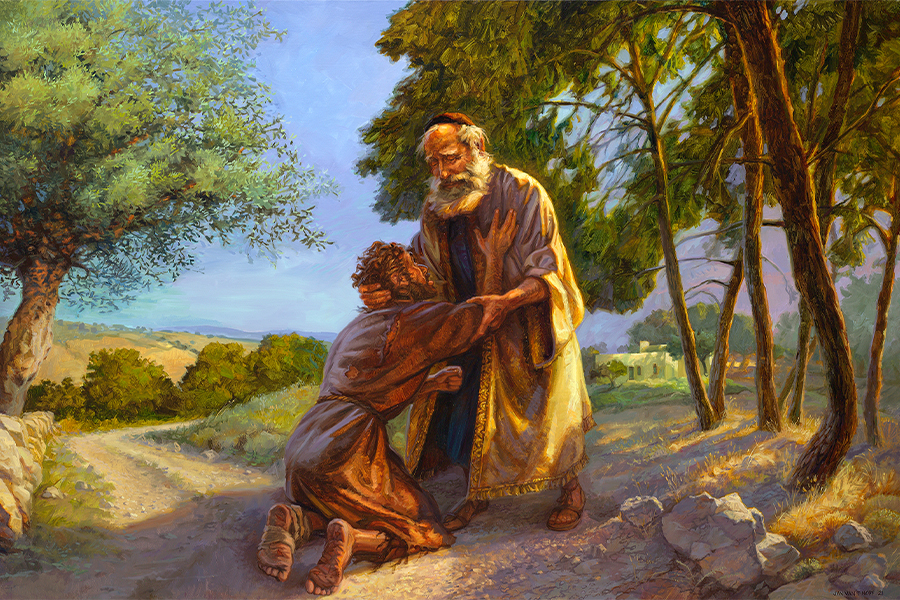St. Francis of Assisi Weekly Reflections

How do you respond to the “Lazarus” in your life?
09-25-2022Weekly ReflectionWe Celebrate Worship Resource, Vol. 47, No. 3We can all fall prey to selective blindness: a purposeful disregard of something we’d rather not see. The more comfortable our own lives are, the easier it becomes to ignore unpleasant things. Witness the rich man in the Gospel. With his nice home, fine wardrobe, and sumptuous meals, he preferred to ignore poor Lazarus outside his door. During their time on earth the rich man’s front gate was as great a divide as the chasm between heaven and hell was later. He was willfully blind to the plight of Lazarus, his brother in the covenant of Abraham. Now he can see clearly, but it’s too late. Amos, in the first reading is even more critical of the well-off among the Israelites, complacent in their luxury while the kingdom of Northern Israel teeter on the edge of collapse. From Amos’s time to Jesus’ to ours, people often become selectively blind to other people’s problems. At the end of Jesus’ story, Abraham says that Lazarus' brothers will not change even “if someone should rise from the dead” (Luke 16:31). But now someone has. Will we change?
Who is someone you have overlooked whom you realize now you should respond to with Christ’s love and compassion?
¿Cómo Responsdes al “Lázaro” en tu Vida?
Todos podemos ser víctimas de la ceguera selectiva: una indiferencia deliberada hacia algo que preferiríamos no ver. Cuanto más cómodas son nuestras propias vidas, más fácil se vuelve ignorar las cosas desagradables. Testimonio del hombre rico en el Evangelio. Con su bonita casa, su fino guardarropa y sus suntuosas comidas, prefería ignorar al pobre Lázaro al otro lado de su puerta. Durante su tiempo en la tierra, la puerta de entrada del hombre rico era una división tan grande como lo fue más tarde el abismo entre el cielo y el infierno. Estaba intencionalmente ciego a la difícil situación de Lázaro, su hermano en el pacto de Abraham. Ahora puede ver claramente, pero es demasiado tarde. Amos, en la primera lectura, es aún más crítico con los ricos entre los israelitas, satisfechos con su lujo mientras el reino del norte de Israel se tambalea al borde del colapso. Desde la época de Amós hasta la de Jesús y la nuestra, las personas a menudo se vuelven selectivamente ciegas a los problemas de otras personas. Al final de la historia de Jesús, Abraham dice que los hermanos de Lázaro no cambiarán aunque “alguien resucite de entre los muertos” (Lucas 16:31). Pero ahora alguien ha resucitado. ¿Entonces cambiaremos nosotros?
¿Quién es alguien a quien has pasado por alto y ahora te das cuenta de que debes responder con el amor y la compasión de Cristo?
The Rich and the Poor
09-25-2022Question of the WeekReading I: Amos 6:1a, 4-7 - Third woe
Reading II: 1 Timothy 6:11-16 - The good fight of faith
Gospel: Luke 16:19-31 - The rich man and Lazarus
Key Passage: There was a rich man and at his gate lay a poor man named Lazarus, covered with sores, who longed to satisfy his hunger with what fell from the rich man's table. (Luke 16:19–21)
Adults: What are the "rewards" of caring for the needs of the poor?
Kids: What is one thing you and your family could do this week to help those who are poor or sick?
Los Ricos y Los Pobres
Lectura I: Amós 6:1a, 4-7 - Tercer ay
Lectura II: 1 Timoteo 6,11-16 - La buena batalla de la fe Evangelio: Lucas 16,19-31 - El rico y Lázaro
Pasaje Clave: Había un hombre rico y a su puerta yacía un hombre pobre llamado Lázaro, cubierto de llagas, que deseaba saciar su hambre con lo que caía de la mesa del rico. (Lucas 16:19–21)
Adultos: ¿Cuáles son las "recompensas" de atender las necesidades de los pobres?
Niños: ¿Qué es lo que tú y tu familia podrían hacer esta semana para ayudar a los pobres o enfermos?

You cannot serve both God and mammon
09-18-2022Weekly ReflectionWe Celebrate Worship Resource, Vol. 47, No. 3When Jesus begins a parable with a rich man, we expect that the parable will end with this man getting his just deserts. Not this time. (Wait until next week.) In this parable, both the rich man and the scheming steward come off pretty well. Why would Jesus tell his disciples a parable like this? Perhaps sneaking a peek at the end of the Gospel will give us a clue. “You cannot serve both God and mammon” (Luke 16:13). You cannot devote yourself to both spiritual wealth and material wealth. Both the rich man and the scheming steward devote themselves to material wealth and are able to take a financial setback and turn it around in their favor. Perhaps Jesus wants his disciples to take the cleverness of the steward’s scheme but apply it to building spiritual wealth (“true wealth” [16:11]) rather than material wealth. After all, all our wealth—our talents, our possessions, our world—ultimately comes from God. We are mere stewards of that wealth.
How can you be a “child of light,” a prudent steward of the spiritual gifts you received?
No pueden ustedes servir a Dios y al dinero
Cuando Jesús comienza una parábola con un hombre rico, esperamos que la parábola termine con este hombre recibiendo su merecido. No esta vez. (Espere hasta la próxima semana). En esta parábola, tanto el hombre rico como el mayordomo intrigante salen bastante bien. ¿Por qué Jesús les diría a sus discípulos una parábola como esta? Quizás echar un vistazo al final del Evangelio nos dé una pista. “No pueden ustedes servir a Dios y al dinero” (Lucas 16:13). No puedes dedicarte tanto a la riqueza espiritual como a la riqueza material. Tanto el hombre rico como el mayordomo intrigante se dedican a la riqueza material y son capaces de tomar un revés financiero y cambiarlo a su favor. Quizás Jesús quiere que sus discípulos tomen la astucia del esquema del mayordomo pero la apliquen a construir riqueza espiritual (“bienes verdaderos” [16:11]) en lugar de riqueza material. Después de todo, toda nuestra riqueza, nuestros talentos, nuestras posesiones, nuestro mundo, en última instancia proviene de Dios. Somos meros administradores de esa riqueza.
¿Cómo puedes ser un “hijo de la luz”, un mayordomo prudente de los dones espirituales que recibiste?
The Value of Honesty
09-18-2022Question of the WeekReading I: Amos 8:4-7 - Against greed
Reading II: 1 Timothy 2:1-8 - Conduct of men and women
Gospel: Luke 16:1-13 or 16:10-13 - The dishonest steward
Key Passage: Whoever is faithful with very little can also be trusted with much; and whoever is dishonest with very little is dishonest also in much. (Luke 16:10)
Adults: Can cheating and deception ever be justified?
Kids: If someone treats you unfairly, do you have the right to
do the same to them?
El Valor de la Honistidad
Lectura I: Amós 8:4-7 - Contra la codicia
Lectura II: 1 Timoteo 2:1-8 - Conducta de hombres y mujeres
Evangelio: Lucas 16:1-13 o 16:10-13 - El mayordomo deshonesto
Pasaje Clave: El que es fiel en lo poco, también es fiel en lo mucho; y el que es deshonesto en lo poco, también es deshonesto en lo mucho. (Lucas 16:10)
Adultos: ¿Se pueden justificar las trampas y los engaños?
Niños: Si alguien te trata injustamente, ¿tienes derecho a hacerle lo mismo?

All are Sought, All are Rescued and Brought Back to the Fold
09-11-2022Weekly ReflectionWe Celebrate Worship Resource, Vol. 47, No. 3Moses had spent forty days on Mount Sinai, a length of time associated with trial and testing, but it is the Chosen People who have been tested, and they have failed. In Jesus’ parable, a single sheep wanders off, failing to stay with the herd. The shepherd responds to the sheep just as the Lord responded to the Chosen People (after Moses’ eloquent plea): with love and forgiveness for all those in his care. The Chosen People, who committed sacrilege in Moses’ absence; Saint Paul, who admits he was “a blasphemer and a persecutor” (1 Timothy 1:13); the wayward sheep, who wandered away; the prodigal son, who forsook his father; all are sought out, all are rescued, all are brought back to the fold. No matter how lost we are or how sinful we are, God will forgive us, welcoming us back and rejoicing in our return. Recall that the parable Jesus tells today are his response to the compliant that he “welcomes sinners and eats with them” (Luke 15:2). Here we are today, sinners all, welcomed to eat at the table of the Lord.
Whom do you need to seek out and forgive?
Todos son buscados, Todos son Rescatados y Devueltos al Redil
Moisés había pasado cuarenta días en el Monte Sinaí, un período de tiempo asociado con pruebas, pero es el Pueblo Elegido el que ha sido probado y ha fallado. En la parábola de Jesús, una sola oveja se desvía y no se queda con el rebaño. El pastor responde a las ovejas como el Señor respondió al Pueblo Elegido (después de la elocuente súplica de Moisés): con amor y perdón para todos los que están bajo su cuidado. El Pueblo Elegido, que cometió sacrilegio en ausencia de Moisés; san Pablo, que se reconoce así mismo como “blasfemo y perseguidor” (1 Timoteo 1:13); la oveja descarriada, que se desvió; el hijo pródigo, que abandonó a su padre; todos son buscados, todos son rescatados, todos son devueltos al redil. No importa cuán perdidos estemos o cuán pecadores seamos, Dios nos perdonará, nos dará la bienvenida y se regocijará en nuestro regreso. Recordemos que la parábola que Jesús cuenta hoy es su respuesta al cumplido de que “recibe a los pecadores y come con ellos” (Lucas 15:2). Aquí estamos hoy, pecadores todos, bienvenidos a comer en la mesa del Señor.
¿A quién necesitas buscar y perdonar?
The Courage to Forgive
09-11-2022Question of the WeekReading I: Exodus 32:7-11, 13-14 - The golden calf
Reading II: 1 Timothy 1:12-17 - Paul's gratitude
Gospel: Luke 15:1-32 or 15:1-10 - The prodigal son
Key Passage: The servant replied, “Your brother has come, and your father has killed the fatted calf, because he has got him back safe and sound.” Then he became angry and refused to go in. His father came out and began to plead with him. (Luke 15:27–28)
Adults: When have you persistently sought after a member of your family who has lost his or her way?
Kids: Have you ever felt you were not getting credit for your good works? What did you do?
El Valor de Perdonar
Lectura I: Éxodo 32, 7-11, 13-14 - El becerro de oro
Lectura II: 1 Timoteo 1,12-17 - La gratitud de Pablo
Evangelio: Lucas 15,1-32 o 15,1-10 - El hijo pródigo
Pasaje Clave: Este le contestó: ‘Tu hermano ha regresado, y tu padre mandó matar el becerro gordo, por haberlo recobrado sano y salvo.” El hermando mayor se enojó y no quería entrar. Salió entonces el padre y le rogó que entrara. (Lucas 15:27–28)
Adultos: ¿Cuándo ha buscado persistentemente a un miembro de su familia que se ha perdido?
Niños: ¿Alguna vez has sentido que no estabas recibiendo crédito por tus buenas obras? ¿Qué hiciste?

Are You Ready to Carry Your Cross?
09-04-2022Weekly ReflectionWe Celebrate Worship Resource, Vol. 47, No. 3Today’s Gospel is a difficult one. Hate your family. Give up all your belongings. Carry your own cross. Who would want to be a disciple? Is this what Jesus really wants us to do? The decision to make all these painful sacrifices seems outrageous. But then, “Who can know God’s counsel, or who can conceive what the Lord intends?” (Wisdom 9:13). Over two thousand years later, God’s will is no less inscrutable. Jesus demands we leave our families and carry our crosses, but at another point he says his burden is light and from the cross he asks his beloved disciple and his mother to care for each other. Perhaps the lesson here is that choosing to be a disciple is a transformational decision, a decision to live a whole different kind of life. His disciples were willing to leave their homes, their families, their jobs, their belongings—their entire lives—because their new lives were now all they desired. Discipleship doesn’t demand that you sacrifice what you want as much as it changes what you want.
Can you recall being so consumed by something that nothing else mattered?
¿Estas Listo para Cargar tu Cruz?
El evangelio de hoy es difícil. Odia a tu familia. Renuncia a todas tus pertenencias. Lleva tu propia cruz. ¿Quién querría ser un discípulo? ¿Es esto lo que Jesús realmente quiere que hagamos? La decisión de hacer todos estos sacrificios dolorosos parece indignante. Pero luego, “¿Quién puede conocer el consejo de Dios, o quién puede concebir lo que el Señor pretende?” (Sabiduría 9:13). Más de dos mil años después, la voluntad de Dios no es menos inescrutable. Jesús exige que dejemos a nuestras familias y carguemos nuestras cruces, pero en otro punto dice que su carga es ligera y desde la cruz le pide a su amado discípulo y a su madre que se cuiden mutuamente. Quizás la lección aquí es que elegir ser un discípulo es una decisión transformadora, una decisión de vivir un tipo de vida completamente diferente. Sus discípulos estaban dispuestos a abandonar sus hogares, sus familias, sus trabajos, su pertenencia—su vida entera—porque sus nuevas vidas eran ahora todo lo que deseaban. El discipulado no exige que sacrifique lo que desea tanto como cambie lo que desea.
¿Puedes recordar haber sido tan consumido por algo que nada más era importante?
Discerning God's Will
09-04-2022Question of the WeekReading I: Wisdom 9:13-18b - Solomon's prayer
Reading II: Philemon 9-10, 12-17 - Plea for Onesimus
Gospel: Luke 14:25-33 - Sayings on discipleship
Key Passage: For who can learn the counsel of God? Or who can discern what the Lord wills? For the reasoning of mortals is worthless, and our designs are likely to fail. (Wisdom 9:13–14)
Adults: How do you try to discover what God is asking of you?
Kids: When is it hard for you to know the right thing to do? Who helps you know?
Discernir la Voluntad de Dios
Lectura I: Sabiduría 9: 13-18b - Oración de Salomón
Lectura II: Filemón 9-10, 12-17-Suplica por Onésimo
Evangelio: Lucas 14: 25-33 - Dichos sobre el discipulado
Pasaje Clave: ¿Quién es el hombre que puede conocer los designios de Dios? ¿Quién es el que puede saber lo que el Señor tiene dispuesto? Los pensamientos de los mortales son inseguros y sus razonamientos pueden equivocarse. (Sabiduría 9: 13–14)
Adultos: ¿Cómo tratas de descubrir lo que Dios te está pidiendo?
Niños: ¿Cuándo es difícil para ti saber lo correcto? ¿Quién te ayuda a saber?